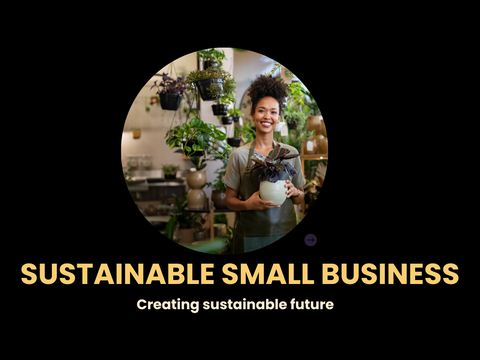Small businesses can have a surprisingly substantial influence on the environment. Small business sustainability is a thriving strategy in the mind of environmentally conscious brands.
Consumers are willing to pay more for non-toxic and eco-friendly products to protect their families and the planet. Customers have started noticing that businesses of all sizes are changing their practices to be more sustainable.
The idea of sustainability is not new to India. In the seven decades since India's independence, the country's large public-sector enterprises, nationalized banks, and state-owned insurance companies have consistently implemented initiatives directed toward economic growth and distributive justice. The country has also joined most major international conservation treaties related to environment , habitat, and species.
The sustainable business idea is directly linked to green industry businesses which are growing at a faster than ever pace in India. Green industry businesses use sustainable materials to make their products. Green industry businesses aim to use as little water, energy, and raw materials as possible while cutting carbon emissions, or they find ways to utilize these materials in renewable and eco-friendly ways. The company's strain on natural resources and contributions to climate change is minimized by this business approach. If waste is generated, it can be recycled as energy or raw material.
Young entrepreneurs and startups in India are creating effective business models that are profitable and eco-friendly. Here are some Indian startups that are working across different sectors with the aim to make
environmentally conscious decisions and contribute to the transition to a greener future-
NapEazy
This startup makes travel pillows which support all 3 Spine-Zone - Neck(Upper-Spine) in the side sleeping, Back(Mid-Spine) in the front sleeping and Lumbar(Lower-Spine) in the back sleeping. It is sweat repellent, lightweight, machine washable and comes with a multi-sleeping mode that makes your long travel super comfortable. A sustainable approach is followed in each business process from sourcing to delivery of the product. NapEazy is making a global mark as one of its kinds of brands.

ZunRoof
As a leading solar energy startup in India, ZunRoof is creating waves by focusing on the residential solar segment by providing the best on-grid solar solutions. Solar energy uses reduce Air pollution, Water pollution, and protect/reduce the uses of conventional natural energy sources such as coal, natural gas and oil which result help reduce CO2 emissions. The start-up is growing rapidly in all of India.
Phool
This is India's very first biomaterial startup and fragrance-focused wellness brand. Phool is a flower recycling technology startup. The startup company uses floral waste, obtained from throwing away temple waste in rivers, to make patented organic fertiliser and charcoal-free luxury incense products. This start-up has invented Feather-leather made from flowers' and with this commercially viable, vegan alternative to animal leather, they hope to make the use of animal leather obsolete.
The Loom Art
This startup makes clothes that are at the intersection of art, handloom, and sustainability. It strives to bring back old and dying art craft techniques and make apparels that last a lifetime. The concept behind the startup is to make sustainability a way of life by creating a program and a platform for weavers and artisans and helping sustain their livelihoods.
Ecosys
This startup provides eco-friendly cleaning products in the form of Polyvinyl alcohol (PVA) capsules which are water-soluble and biodegradable substances. These 10 ml capsules make 1 L of cleaning solution when dissolved in water and this startup aims to reduce or purchase a new cleaning solution, packed in plastic materials.
There are many more starting at a small level however with the big aim of making the earth greener with a sustainable business approach. There are few things in common with all these startups or any big companies in this space that they are focusing on each business step to convert into effective, sustainable and environment-friendly solutions. When used in isolation, these can even be used as a potential business idea to start a green business model:
- Small business sustainability starts at the source. The first step toward bringing about your business more environmentally friendly is inquiring the following questions about your source materials- Are they sourced sustainably? Are they fair trade? Are they made with recyclable, renewable, and/or biodegradable materials? Do you practice green procurement?
- You can significantly reduce your brand's pollution contribution by changing the way you package your products. Eco-friendly packaging such as biodegradable packaging, packaging that doesn't use a mishmash of materials which makes it recyclable or providing small reusable items attached with a logo have quite a positive impact on the environment and consumer.
- The sustainable storage-A hidden aspect of small business sustainability is where products are stored before being sold. Choose an eco-friendly structure that uses renewable energy for climate control, such as solar panels. Pack items in green containers rather than pollutive plastics. If you need to alleviate items you no longer have use for, consider donating them instead of throwing them away.
- Green shipping and delivery Don't put a tiny package in a box five times its size. Use packaging that is as compact as possible to minimize cost as well as the amount of space your product takes up in the carrier. This will result in fewer trips and fewer emissions. Putting a small boxed item into a second or third box before shipping is big No. Use of environmentally friendly shipping materials such as Biodegradable filler, starch-based packing peanuts, Recycled cardboard, and Compostable bags.



